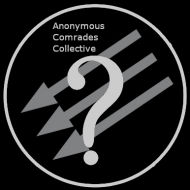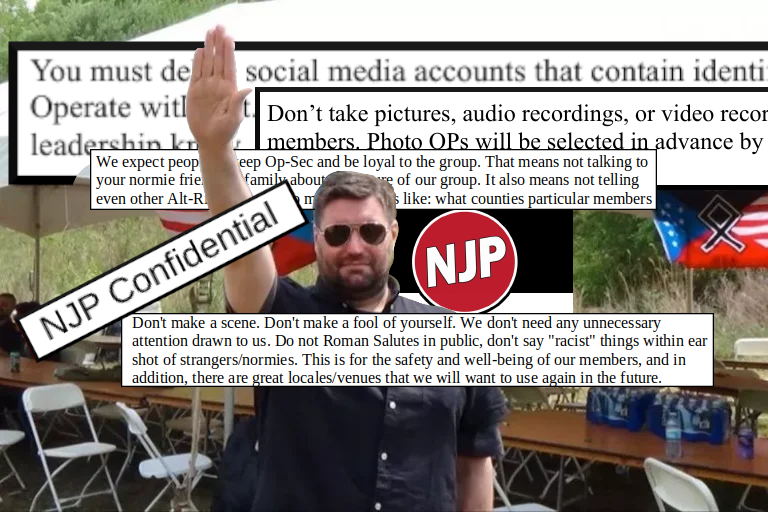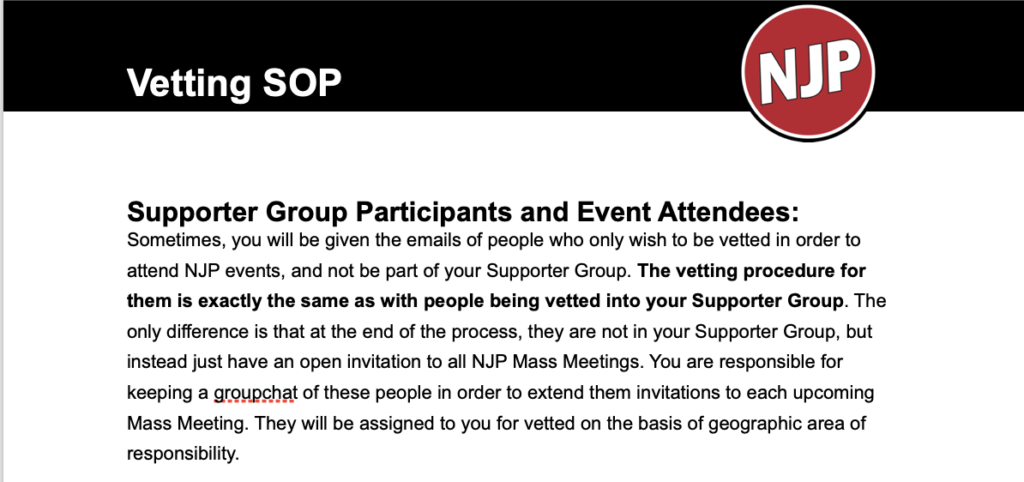
In our previous article, the Anonymous Comrades Collective shared a document from our archives showing the cult-like 'vetting' policies that were used to screen recruits for 'Pool Parties,' the real life meet-up groups associated with the neo-Nazi podcast network The Right Stuff (TRS.) The Pool Parties were informal, locally organised, and served as a social and friends network for white nationalists and neo-Nazis. Although ostensibly organised under a TRS umbrella, the Pool Parties were historically non-exclusive and open to members of disparate groups who shared similar racist and antisemitic views.
Formed in 2020, The National Justice Party (NJP) was publically headed up by TRS co-owner Michael Peinovich aka 'Mike Enoch',who assumed the ostentatious title of 'Chairman.' Shortly after NJP formed they tried to co-opt the original Pool Party system by imposing paid membership on all previous participants. Longstanding Pool Party leaders and members were understandably irked that inclusion in the newly-dubbed 'Supporter Groups' required thirty dollar mandatory monthly NJP dues. This new levy came bundled with a free TRS network subscription, the $10 real cost of that was paid to directly to the network.
In what was rightly seen as a blatant money and control grab, the new Supporter Group structure was now contingent upon exclusivity, barring membership in competing white nationalist organisations.
There was also a new required commitment to participating in risky real life activism including street protests and illegal stickering campaigns. Dozens of NJP 'activists' have already been doxed and otherwise exposed as a result of their participation in these ill-advised public activities.
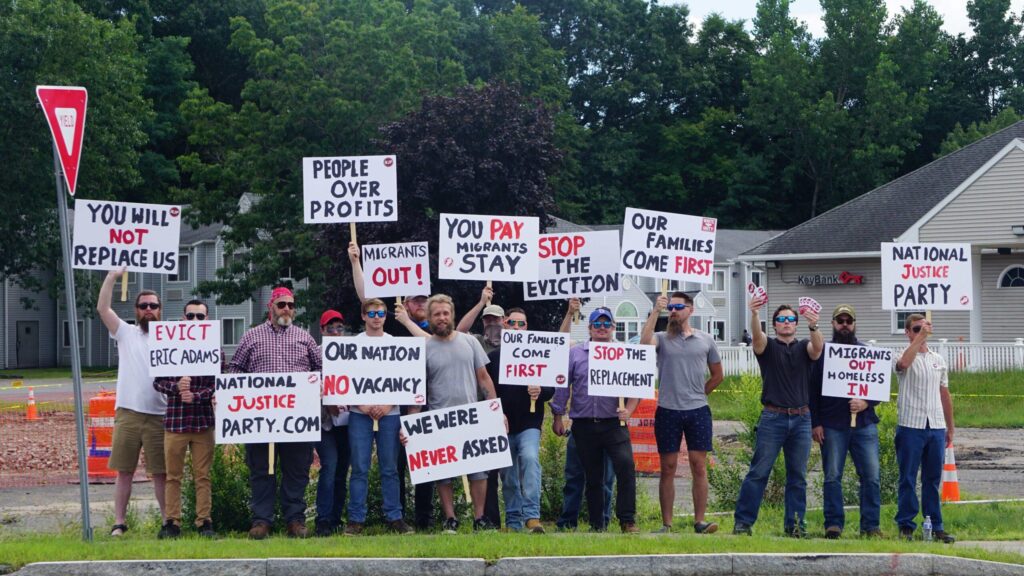

Longstanding Pool Party leaders were even subjected to re-vetting which included 'background checks.' These forced changes triggered a mass exodus of members including some Pool Party groups leaving the network entirely.
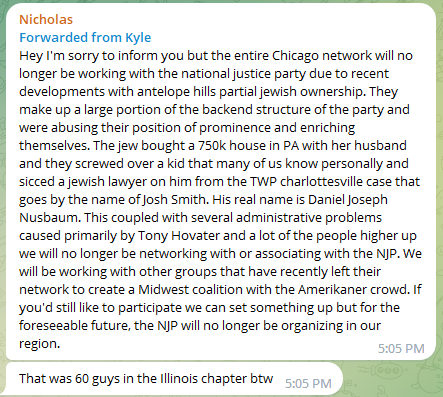
In December 2023, after an ugly series of purges, sex scandals, and petty infighting, The National Justice Party suddenly collapsed. The alleged 'political party' was actually a for-profit LLC and never put forth a single candidate, ballot initiative, or engaged in any legitimate political activity. The entire operation was revealed as a massive grift and hundreds of thousands of dollars in member dues and donations disappeared into thin air. No refunds were offered, although certain insiders and lawyers were given large cash payments. The NJP 'leadership' scattered in a shocking frenzy of backstabbing, mudslinging, and general ratfuckery. Longtime friends and colleagues publicly pointed fingers and trashed each other.
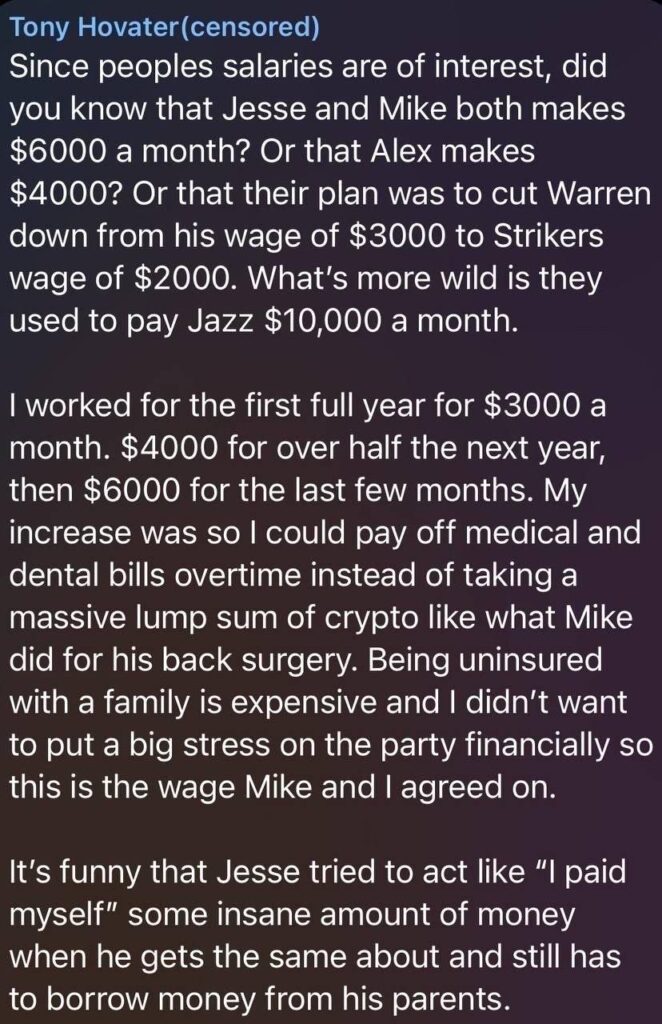
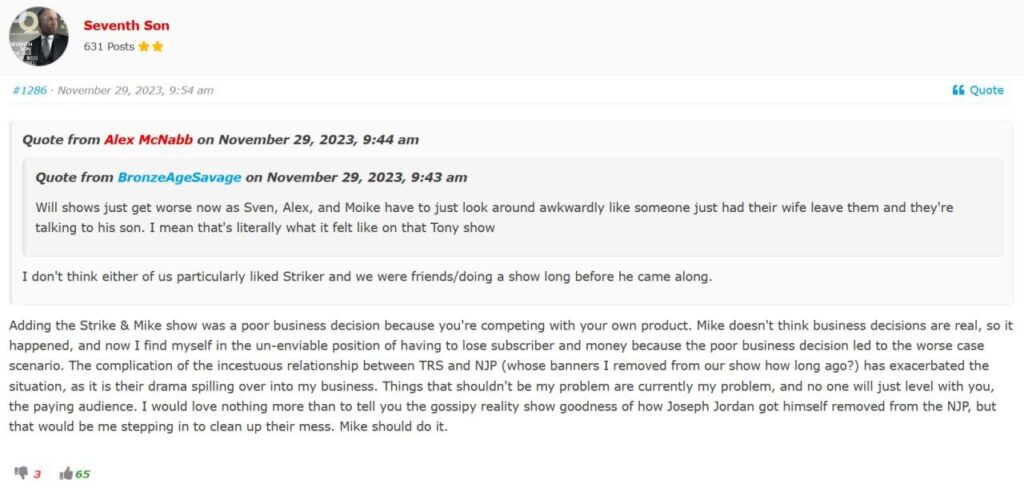
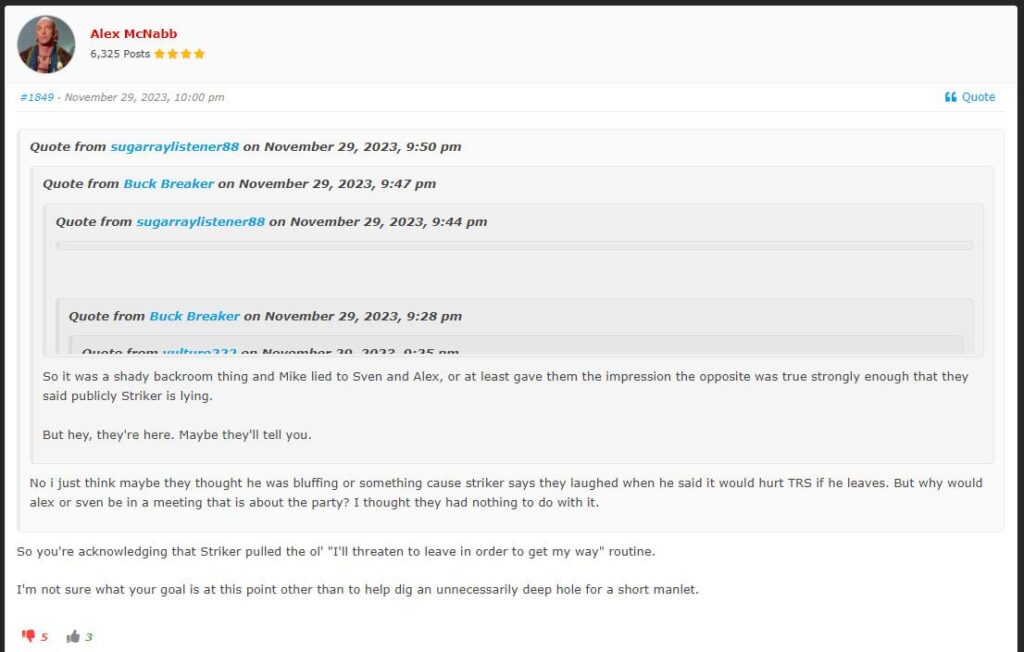
Not surprisingly, the resulting hard feelings have spurred an avalanche of leaks from multiple disgruntled TRS and NJP insiders. An attempt by former NJP Supporter Group leaders to rebrand as The Nationalist Coalition imploded almost instantly when their founding membership roster including real names and addresses was leaked. Within 24 hours of publication, the Nationalist Coalition web presence was deleted.
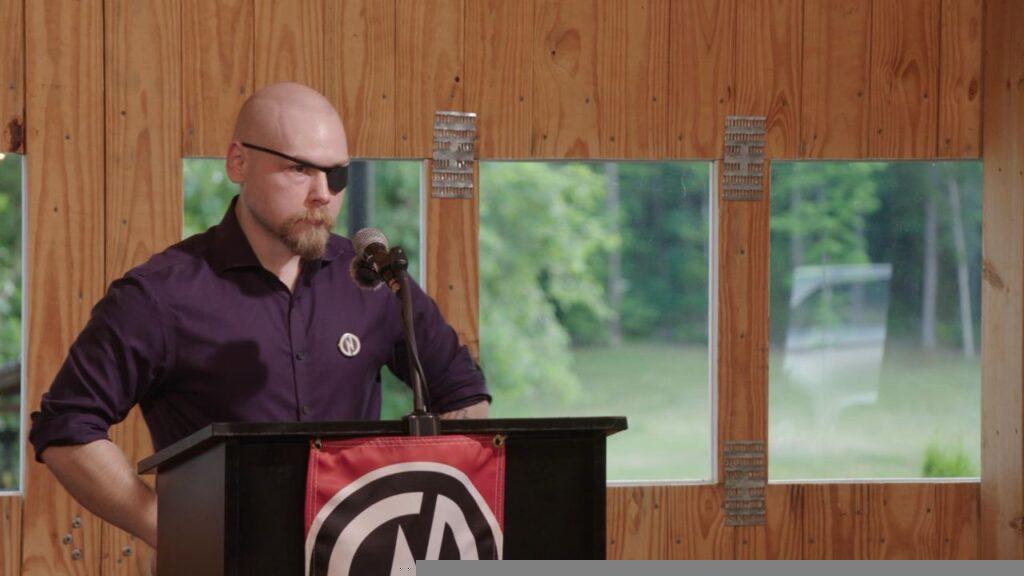
NJP's Supporter Group 2023 'Standard Operating Procedure' vetting instructions were allegedly developed by developed by a 'country-wide team of interviewers with thousands of hours of combined experience.' The volunteer NJP vetting agents are assigned weighty responsibility as 'our FIRST and perhaps ONLY line of defense against bad actors entering the network.'
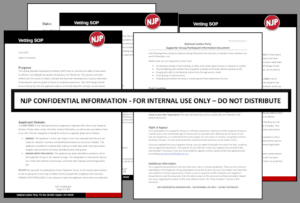
The document is largely based upon the previously leaked 2019 TRS Pool Party version, but there were some significant modifications and enhancements.
The vetting Standard Operating Procedure (SOP) aims to minimize the ability of bad actors to infiltrate, and highlight low-quality individuals to be filtered out. This process has been refined over the course of nearly a decade and has been developed by a country-wide team of interviewers with thousands of hours of combined experience. This SOP design should ensure that by the time the applicant makes it to the last step (IRL meetup), we are almost sure that they are a high-quality applicant coming to us in good faith.
If you are responsible for vetting, that makes you our FIRST and perhaps ONLY line of defense against bad actors entering the network. You are encouraged to do research into interview and questioning techniques used by corporations and law enforcement, which are readily available online. In addition to this, you are expected to employ the following procedure in conjunction with the questions provided in this document.
Early on in the document, the procedures for 'Applicant Denials' are spellled out:
If at ANY POINT in the interview process a applicant is deemed unfit, inform your Regional Director of their name, email, and other contact information, as well as why you believe them to be unfit. The two categories of denial for entry to a supporter group are as follows;
- DENIED; The applicant in some way shape or form has indicated that they are not ready for induction, but have not identified themselves as any kind of liability. This applicant is qualified to continue their vetting at a later date when they have shown tangible improvement in the areas identified by the vetting team.
- DENIED WITH PREJUDICE; The applicant has been identified to present a risk to the Supporter Group or the network at large. This designation is reserved for bad actors, those with extreme social issues, and those with ongoing extreme legal liabilities.
DO NOT put yourself, the participants of your Supporter Group, or the country-wide network at risk by going out of your way to further involve yourself with a applicant who has been DENIED WITH PREJUDICE. If you choose to reject the applicant, inform them via email that “After consideration by the vetting team, your application has been rejected.” You should not elaborate on your reasons.
While there is a distinction between the actual Supporter Group membership and those who merely wish to participate in 'NJP Mass Meetings,' the same rigourous vetting standards are supposed to be utilised.
Supporter Group Participants and Event Attendees:
Sometimes, you will be given the emails of people who only wish to be vetted in order to attend NJP events, and not be part of your Supporter Group. The vetting procedure for them is exactly the same as with people being vetted into your Supporter Group. The only difference is that at the end of the process, they are not in your Supporter Group, but instead just have an open invitation to all NJP Mass Meetings. You are responsible for keeping a groupchat of these people in order to extend them invitations to each upcoming Mass Meeting. They will be assigned to you for vetted on the basis of geographic area of responsibility.
You will also encounter people who support the NJP and are not bad actors, but for one reason or another, do not fit into your Supporter Group. If you make this determination for someone during the vetting process, treat them as part of the above group.
In the past, video interviews for Pool Party applicants were strongly discouraged as an obvious security risk. In a very significant new deviation, prospective NJP members were required to submit to a 'non-negotiable' hour long 'Video Interview.' File this one under: WHAT COULD POSSIBLY GO WRONG?
Vetting Process
Step 1: Email correspondence
- Initial contact will always be carried out via email.
- No vetting questions should be asked during the email phase. Applicants should answer all questions off the cuff, live, on video. They should not be allowed time to mull over, or if bad actor, consult with advisors on the best talking points. Email correspondence should strictly be for scheduling the interview, nothing else.
- Inquire of what county they are in, to confirm they are in your area of responsibility.
Step 2: Video Interview
- This interview will require the applicant to have their video feed on; this is non-negotiable. If the applicant is unwilling to comply, they will be denied further consideration for participation.
- Be respectful of everyone’s time. Interviews should generally aim to be around an hour long, and always less than 90 minutes total. There are steep diminishing returns with length over an hour. It is best to ask unanswered questions at a future time.
- Have a dedicated note taker to take thorough notes on everything during the interview. It is critical that the interviewer asking the questions should not take notes until after the call is concluded. The interviewer should be focusing on talking to the applicant, with no distractions. You may also wish to have a third person who can listen in to the call to provide another perspective on the applicant. Generally you do not want more than 4 or 5 people on the call including the interviewee. The more people on the call, the greater the pressure is to cater answers to the crowd rather than being candid, honest and complete.
- Notes must be typed in an easily shareable file format. If handwritten, they must be transcribed or scanned into a digital format.
- Begin the interview with a fact finding interview introduction. The idea is to convince the applicant that you want honesty rather than the “right answers.”
- The interviewers should ask questions from the questions list inthis document throughout the interview. Ask questions to force elaboration.
- The idea is to establish a baseline and use redundant questioning to expose discrepancies later in the process. The more the applicant talks, the better.
- Enjoy the silence. Learn to embrace awkward pauses and silence in conversation. Never be the first one to break the silence. A candidate's self-consciousness and uncertainty in your opinion with their response will drive them to expand upon their remarks, often with new details, to fill the void.
- Maintain one degree of emotionality below anyone else in the call. Always be driving the call to a neutral, emotionally non-charged, open feeling tone. Your goal is to be the calmest and most level-headed voice in the room. The toughest and most confrontational questions should be asked in the least aggressive and non-judgmental manner possible.
- When concluding the interview, always ask the applicant if they have any questions for you. It is usually insightful to hear the kinds of questions they have. Of course, DO NOT answer any questions that could be considered a component of operational security. (one common question is, "how many people are in the group?" this is likely asked out of genuine curiosity, but you should not answer this question with a specific number or even a range, "we have a sizable group.")
- Lastly, before concluding, reinsure what the group is. "We are a community of like-minded people interested in pro-white politics; we do not engage in or tolerate illegal activities.”
- Following the interview with the applicant, the interviewers should discuss if the applicant is eligible to proceed to the next step. Be sure to bring any notable responses and concerns to the vetting team regarding the applicant.
- With your other interviewer, discuss any points of interest or concern, and plan for what to question the applicant about more on a second interview.
- If the applicant is deemed eligible for advancement by the interviewers and confirmed by the vetting team leaders, advance the applicant to the next step.
- If the applicant is deemed ineligible by the interviewers and the vetting team leaders confirm this, the applicant will be denied further consideration for participation.
The third step in the process sees the applicant advance to a 'Vetting Tank,' chat room on either Threema or Telegram where they are screened for any discrepancies and 'problematic idiosyncrasies.'
Step 3: Vetting Tank chat
- The applicant will be placed into the Vetting Tank chat room. Some people are more talkative than others in chat rooms. Try to encourage conversation.
- This is another opportunity to expose discrepancies. Additionally, observe for signs of problematic idiosyncrasies; these are not always dealbreakers but may need to be addressed in the second interview.
- The amount of time an applicant remains in the Vetting Tank is based on a case-by-case basis.
- Once the vetting team has gotten a sense of the applicant in the vetting tank, move to Step 4.
The fourth vetting step is yet another interview in which the financial component of the 'NJP Supporter requirements' are broached with repeated emphasis on the understanding that 'giving concrete material support to the Party in terms of time or money' is mandatory.
Step 4: Interview #2
1. This interview will only require audio, NO VIDEO REQUIRED; this will help keep the applicant at ease, leading to them speaking more freely.
2. There will be at least TWO participants from the vetting team present.
3. This stage of interviewing is more confrontational. Unlike the neutral fact finding nature of the first interview, the second interview should focus on questioning the applicant. Ask hard questions about areas of concern. If there are no specific concerns, this is a good time to ask the applicant to explain their understanding of the risks of involvement, what they can offer, and if they will comply with NJP Supporter requirements (giving concrete material support to the Party in terms of time or money).
4. Investigate any concerns from the first interview and the vetting tank. Ask questions that inform you about their ideological understanding and character. Your questions should be challenging and force introspection.
5. It is essential to force a confrontation with the potential risk they are taking getting involved with an IRL group. We want to ensure that they understand those risks. The point is not to scare the applicant but instead to make sure they comprehend the reality of our political crisis.
Ensure that you ask them what they personally hope to gain from joining a Supporter Group (in addition to what they hope to contribute)
6. Ensure that the applicant understands that being a paid Supporter is a requirement for joining a Supporter Group.
7. When concluding the interview, ask the applicant if they have any questions for you. It is usually insightful to hear the kinds of questions they have.
Of course, DO NOT answer any questions that could be considered a component of operational security.
8. Following the interview with the applicant, the interviewers should follow up to discuss if the applicant is eligible to proceed to the next step or be denied further consideration. Be sure to bring any notable responses and concerns to the vetting team regarding the applicant.
If the applicant is deemed eligible for advancement by the interviewers and confirmed by the vetting team leaders, advance the applicant to the next step.
It may be decided that further interviewing is required. Repeat Step 4.
If the applicant is deemed ineligible by the interviewers and the vetting team leaders confirm this, then the applicant will be denied further consideration for participation.
The next stage in vetting requires an in-person meeting with the applicant where the financial commitment is again emphasised, 'Be sure to broach the topic of dues with the applicant. Make sure they understand this expectation.'
Step 5: IRL Interview
1. At least TWO participants of the vetting team must be present for the IRL interview.
2. Pick a location that is public and conveniently located. Don't give out the exact location to the applicant until the day of.
It is best practice to give them the address of a location nearby to the ‘true’ vetting location. You then walk over to the ‘true’ vetting location. A busy coffee shop is ideal as a meet up point.
3. It is important to be aware of your surroundings upon arriving. At this point, it is improbable your applicant is a bad actor, but you should still maintain constant situational awareness for your safety and security. Both interviewers should remove themselves from the situation as calmly and quickly as possible if anything is off.
4. This meetup is less of an interview and more of a friendly meeting; allow them to talk about themselves and their family, get to know them. Before getting to this point, you should have been confident that this person would be a good fit for the group.
5. Be sure to broach the topic of dues with the applicant. Make sure they understand this expectation.
The most important thing is to keep the prospect talking. You aren't always looking for simple "right" answers. Ask difficult questions. Find inconsistencies in their story and press them on it. This is when you truly find out about a person.
If the meeting concludes without incident and all parties involved are satisfied, begin the process of integrating the prospect into your group.
If the meeting does not go well, repeat this step as necessary, or deny the applicant.
The document also lays out a loose script of the sort of questions that should be asked at the various interview stages. These include a bog-standard probing into the interviewee's level of antisemitism and understanding of the 'Jewish Question.'
-
What is the JQ?
- What is the holocaust?
- What is the political utility of the holocaust?
- What is your favorite holocaust lie/story
Other questions are illustrative of the role fandom and Nazi e-celebrity plays in the whole undertaking, teasing out the possibility of a podcast appearance and the illustrious honour of dining with 'one of the Central Comittee members.'
-
If you could sit down for dinner with one of the Central Committee members, what would you want to say/ask them?
-
If you could go on a podcast which one would it be and why?
It is worth noting that the prospective applicant is repeatedly encouraged to join the NJP 'supportership platform,' a vehicle for non-members to contribute money regardless of vetting status:
-
Are you an active subscriber to the NJP’s supportership platform?
-
How long have you been subscribed (optional: ask to see their Supporter card after the fact to see if they lie or exaggerate)
-
If not, why? (Encourage prospect to consider contributing)
-
The entire list of recommended questions and interrogation strategies is provided below:
Questions:
Do not simply run down the list of questions. Follow conversational threads, ask follow-up questions, and circle back to points of interest throughout the conversation as needed. The interviewer should ask questions in a casual, conversational, non-judgmental manner. Whenever possible, questions should be asked in such a way that the “right answer” is not immediately apparent. Remember that the questions in the Vetting SOP documents are prompts for information you should know about the applicant, not a list of lines to read.
Always check the phrasing of your questions; avoid leading the interviewee. You may have spoken verbally or in text with this person for quite some time. Your questions and your phrasing may unintentionally prompt someone to give you answers that you want to hear. The goal of these interviews is to let them show their true selves.
Be relatable in responses. Share anecdotes real or fake that mirror, or affirm a candidate's responses or opinions. People are more open and less guarded with those they can relate to or identify with. Interviews are not the time and place to express moral judgements to an applicant.
Follow the 80/20 Rule: The applicant should do 80% of the talking. Do not interrupt them. If you think of something you'd like to follow up on while the applicant is speaking, jot down a one- or two-word prompt to remind yourself to follow up on later.
First Call
- How did you get referred to us?
- What is your red pill story?
- What prompted you to move offline and try to organize IRL?
- If redpilled more than 6 month ago: why now and not before?
- Have you ever been involved in any other political organization?
- Are you currently involved with any political membership organization? (Not allowed)
- Have you ever previously considered or are currently considering joining any other WN organization?
- (if yes) Why choose NJP?
- Assuming there would be no social repercussions, how would you label your political beliefs to a stranger?
- What does that political label mean to you?
- What is the JQ?
- What is the holocaust?
- What is the political utility of the holocaust?
- What is your favorite holocaust lie/story
- Do you consider yourself religious?
- (IF strongly identity as religious) If you had to live as a minority in your faith in a white country or as a white minority in a country that was majority representative of your faith which would you chose and why?
- Are you comfortable working around others of different beliefs?
- Are you comfortable being around others who might indirectly criticize your beliefs?
- What is your ethnic background?
- Do you, to your knowledge, have any Jewish heritage?
- What does White mean to you?
- What podcasts do you listen to? (ask them to name the hosts of some of the TRS podcasts they listen to)
- Without giving a specific number, what is your general age?
- Have you ever been convicted of a felony?
- In the past 3 year have you used any controlled substances, either illegal or prescription drugs
- Without being specific, what general industry do you work in?
- Have you ever worked in Law enforcement? (WE DO NOT ALLOW LAW ENFORCEMENT IN OUR GROUPS UNDER ANY CIRCUMSTANCES)
- Have you ever been employed by the federal government, or any state and local governments?
- Have you ever been in the military (active duty, reserves, or guard)?
- Historically, who do you believe to be the most inspirational political figure?
- What are some of your non-political hobbies?
- Is your family aware of your politics?
- Wife/Girlfriend/Children? Are they aware of your politics?
- How would you respond if they confronted you about your politics?
- Do you have friends or colleagues who are aware of your beliefs?
- If any are receptive, would you bring them to an NJP event?
- Are you a US citizen? Are you a citizen of another country (dual citizenship)?
- What are your thoughts on the National Justice Party?
- Do you listen to the speeches?
- Do you have a favorite speech?
- What does NJP mean to you?
- Are you an active subscriber to the NJP’s supportership platform?
- How long have you been subscribed (optional: ask to see their Supporter card after the fact to see if they lie or exaggerate)
- If not, why? (Encourage prospect to consider contributing)
- What do you think the NJP is doing well; what are some of the things that you really like that the NJP does?
- Where do you envision the NJP and its supporters in 5, 10 years?
- Do you plan on attending NJP mass meetings?
- How often do you expect to be able/have interest in attending local and regional meetings?
- If you didn’t have to worry about making a living, what would you do with your time?
- Do you have any questions for us?
- How do you think I rate as an interviewer?
2nd Call, or, additional questions
- What is something interesting that you heard on a podcast or saw in the news since the last interview?
- What are you looking forward to when you join the group?
- (if prospect was not a supporter follow up and ask if they have since signed up)
- Have you listened to any more NJP Speeches? What did you think?
- What are you looking to gain from involvement with the NJP Supporter Group?
- What does a good NJP Supporter look like to you?
- What do you hope to contribute to the NJP by your participation in the Supporter Group?
- What is a blind spot the movement has today, and/or what correction could we make that can make us more effective?
- What criticisms do you have for the NJP?
- What potential risks do you perceive with your participation in a Supporter Group?
- What steps do you take / do you plan on taking to mitigate those risks?
- What are some qualities of an effective leader that you see as lacking within the leaders of the movement today.
- What qualities do you look for in someone you are willing to follow as a leader
- What makes someone a good follower?
- (If applicant has indicated a large degree of secrecy with respect to their spouse/family that they live with, ask if they have had more honest conversations with spouse/family)
- If unmarried with children, is ex aware of politics? (this could be a potential issue if custody is contentious)
IRL Questions
- If you could sit down for dinner with one of the Central Committee members, what would you want to say/ask them?
- If you could go on a podcast which one would it be and why?
- Do you have any doubts or concerns about joining the supporter group?
- How would you rate your level of stability in your life?
- How do you deal with pressure or stressful situations?
- If approached by law enforcement asking about your involvement with NJP, how would you respond and handle the situation?
- What is your greatest fear?
- What is your proudest moment/accomplishment?
- How would your friends and family describe you?
- Which aspects of the dissident right culture do you find the most objectionable?
- What are your favorite conspiracy theories?
- Why do you think you’d be a good fit for our NJP Supporter Group?
- What are the types of people that you would admit to NJP Supporter Groups, and who would you not admit?
The memo spans nearly a dozen pages before adding a series of appendixes with recommended email templates.
Appendixes
Note: Email templates provided here as for reference only. Please change them to accommodate the situation as needed.
Appendix A: Initial email
“
Hello,
Thank you very reaching out for vetting. We would like to schedule a time to call with you. Please provide your availability for the next two weeks. The call will take place over Jitsi, a free videoconferencing service. For full disclosure, you are required to have your camera on during the call. It will be with myself and 1-2 other members of the local vetting team.
Additionally, please inform us of your approximate geographic area (county is fine).
Thank you,
[signature block]
“
Appendix B: Applicant Denial Emails
Denial, possibility to re-apply, good to attend events:
“
Hello,
Thank you very reaching out for vetting. We enjoyed having a chance to speak with you. After consideration by the vetting team, we do not believe you are a good fit for us at this time. Principly, we are denying you because [reasons]. We encourage you to [ways to improve], and would like to ask you to apply again in [6 months to a year].
However, while we do not believe you are a great fit for the local Supporter Group at this time, we do not believe you to be a bad actor or otherwise hostile the the NJP. We would like to extend to you an open invitation to future NJP Mass Meetings. Please let me know if you are interested in RSVPing to these upcoming Mass Meetings: [List out all the upcoming publicly announced ones]. Attending these will also allow our vetting team to interact with you in person.
Thank you,
[signature block]
“
Denial, possibility to re-apply, not good to attend events:
“
Hello,
Thank you very reaching out for vetting. We enjoyed having a chance to speak with you. After consideration by the vetting team, we do not believe you are a good fit for us at this time. Principly, we are denying you because [reasons]. We encourage you to [ways to improve], and would like to ask you to apply again in [6 months to a year].
Thank you,
[signature block]
“
Denial, no possibility to re-apply, not good to attend events:
“
Hello,
Thank you very reaching out for vetting. We enjoyed having a chance to speak with you. After consideration by the vetting team, we do not believe you are a good fit for us.
Thank you,
[signature block]
“
Denial with Prejudice:
“
Hello,
After consideration by the vetting team, your application has been rejected.
Thank you,
[signature block]
“
Appendix C: 2nd stage email
“
Hello,
It was great speaking with you on [date]. We would like to move forward to the next step with your vetting application. Please create an account on the encrypted messaging app "Threema" and message me on there; it is an anonymous encrypted communications app.
My Threema ID: [Your ID]
Once there, I will put you into a vetting tank with a small selection of other Supporter Group members so you have a chance to speak with us electronically prior to any in person meeting. There will be other unvetted people in that chat, so exercise caution over what details about yourself that you review.
Thank you,
[signature block]
Despite a constant stream of puffery and exaggeration, the National Justice Party never drew in more than a few hundred members. NJP leadership would often publicly claim event attendance at twice the actual numbers of participants, a fact that did not go unnoticed by attendees. Amongst the white nationalist gossip circles there was a growing sense that the entire operation was untrustworthy.
Much of NJP's recruitment failure is clearly tied to a convoluted, contradictory, arbitrary, and VERY labour intensive vetting process. While the National Justice Party did have a paid staff, the arduous and byzantine vetting seems to have been largely offloaded onto unpaid volunteers with predictably unpredictable results. The National Justice Party crippled its own growth with a hilariously overwrought membership process that left prospective recruits dangling for months, and even years.
A particularly jarring example of other incongruity is the privacy driven directive to only use aliases paired with an absolute OPSEC shitshow with the insistence on an incriminating video interview.
While the limitations of the National Justice Party's vile ideology would stymy any true political significance, their ultimate failure is based in the deficiencies in the quality and character of their human leadership. They failed to inspire much more than distrust and discord and, in the end, they simply failed to bring in enough members and money. The oft-reported logjams that plagued and paralysed the NJP vetting process seem less due to selectivity than rank bureaucratic incompetence and inefficiency. These dumb Nazi dinosaurs stumbled into a tar pit of their own making.

In upcoming installments we will delve deeper into the National Justice Party Supporter Groups Op-Sec' policies and leadership.
